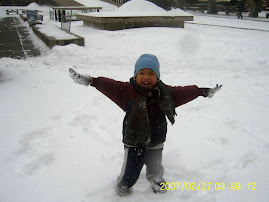Sunday, October 26, 2008
Discovering My Multiple Intelligences
Just like Glenn, I've also wondered what types of intelligences I have so I followed suit and also took the test taken from the site called, Multiple Intelligences for Adult Literacy and Education.
Your top three intelligences:
Intelligence Score (5.0 is highest)
Description:
Language: 4.57
You enjoy enjoy saying, hearing, and seeing words. You like telling stories. You are motivated by books, records, dramas, opportunities for writing. Effective techniques of enhancing your learning using your language intelligence include reading aloud, especially plays and poetry. Another idea is to write down reflections on what you've read. You may also enjoy exploring and developing your love of words, i.e., meanings of words, origin of words and idioms, names. Use different kinds of dictionaries. Other ideas:
* Keep a journal
* Use a tape recorder to tape stories and write them down
* Read together, i.e., choral reading
* Read a section, then explain what you've read
* Read a piece with different emotional tones or viewpoints — one angry, one happy, etc.
* Trade tall tales, attend story-telling events and workshops
* Research your name
Body : 3.71
Body Movement: You like to move, dance, wiggle, walk, and swim. You are likely good at sports, and you have good fine motor skills. You may enjoy taking things apart and putting them back together. Incorporating body movement into your learning will help you process and retain information better. Here are some ideas.
* Trace letters and words on each other's back.
* Use magnetic letters, letter blocks, or letters on index cards to spell words.
* Take a walk while discussing a story or gathering ideas for a story.
* Make pipe cleaner letters. Form letters out of bread dough. After you shape your letters, bake them and eat them!
* Use your whole arm (extend without bending your elbow) to write letters and words in the air.
* Change the place where you write and use different kinds of tools to write, ie., typewriter, computer, blackboard, or large pieces of paper.
* Write on a mirror with lipstick or soap.
* Take a walk and read all the words you find during the walk.
* Handle a Koosh ball or a worry stone during a study session.
* Take a break and do a cross-lateral walk.
Musical : 3.43
Musical: You like the rhythm and sound of language. You like poems, songs, and jingles. You enjoy humming or singing along with music. You probably remember things well when they are associated with music or rhythm. Try to incorporate sounds into your lessons, such as using a familiar tune, song, or rap beat to teach spelling rules, or to remember words in a series for a test. Here are some other ways to use your musical intelligence:
* Create a poem with an emphasis on certain sounds for pronunciation.
* Clap out or walk out the sounds of syllables.
* Read together (choral reading) to work on fluency and intonation.
* Read a story with great emotion — sad, then happy, then angry. Talk about what changes — is it only tone?
* Work with words that sound like what they mean (onomatopoeia). For example: sizzle, cuckoo, smash.
* Read lyrics to music.
* Use music as background while reviewing and for helping to remember new material.
* Use rhymes to remember spelling rules, i.e., "I before E except after C."
Your top three intelligences:
Intelligence Score (5.0 is highest)
Description:
Language: 4.57
You enjoy enjoy saying, hearing, and seeing words. You like telling stories. You are motivated by books, records, dramas, opportunities for writing. Effective techniques of enhancing your learning using your language intelligence include reading aloud, especially plays and poetry. Another idea is to write down reflections on what you've read. You may also enjoy exploring and developing your love of words, i.e., meanings of words, origin of words and idioms, names. Use different kinds of dictionaries. Other ideas:
* Keep a journal
* Use a tape recorder to tape stories and write them down
* Read together, i.e., choral reading
* Read a section, then explain what you've read
* Read a piece with different emotional tones or viewpoints — one angry, one happy, etc.
* Trade tall tales, attend story-telling events and workshops
* Research your name
Body : 3.71
Body Movement: You like to move, dance, wiggle, walk, and swim. You are likely good at sports, and you have good fine motor skills. You may enjoy taking things apart and putting them back together. Incorporating body movement into your learning will help you process and retain information better. Here are some ideas.
* Trace letters and words on each other's back.
* Use magnetic letters, letter blocks, or letters on index cards to spell words.
* Take a walk while discussing a story or gathering ideas for a story.
* Make pipe cleaner letters. Form letters out of bread dough. After you shape your letters, bake them and eat them!
* Use your whole arm (extend without bending your elbow) to write letters and words in the air.
* Change the place where you write and use different kinds of tools to write, ie., typewriter, computer, blackboard, or large pieces of paper.
* Write on a mirror with lipstick or soap.
* Take a walk and read all the words you find during the walk.
* Handle a Koosh ball or a worry stone during a study session.
* Take a break and do a cross-lateral walk.
Musical : 3.43
Musical: You like the rhythm and sound of language. You like poems, songs, and jingles. You enjoy humming or singing along with music. You probably remember things well when they are associated with music or rhythm. Try to incorporate sounds into your lessons, such as using a familiar tune, song, or rap beat to teach spelling rules, or to remember words in a series for a test. Here are some other ways to use your musical intelligence:
* Create a poem with an emphasis on certain sounds for pronunciation.
* Clap out or walk out the sounds of syllables.
* Read together (choral reading) to work on fluency and intonation.
* Read a story with great emotion — sad, then happy, then angry. Talk about what changes — is it only tone?
* Work with words that sound like what they mean (onomatopoeia). For example: sizzle, cuckoo, smash.
* Read lyrics to music.
* Use music as background while reviewing and for helping to remember new material.
* Use rhymes to remember spelling rules, i.e., "I before E except after C."
Friday, October 10, 2008
Winner!
 One afternoon, i picked up my son from school...i was surprised to hear "Congrats!" from other parents at the waiting area! I didn't know that Raph joined a contest that day...at singing contest pa ha! When he came out of their classroom, he was so happy! He kept saying: "I'm the champion!" and "I never had this before!" -referring of course to the trophy. Yup this was his first trophy, he had medals though before. Congrats anak! Smart na, singer pa! hehe!
One afternoon, i picked up my son from school...i was surprised to hear "Congrats!" from other parents at the waiting area! I didn't know that Raph joined a contest that day...at singing contest pa ha! When he came out of their classroom, he was so happy! He kept saying: "I'm the champion!" and "I never had this before!" -referring of course to the trophy. Yup this was his first trophy, he had medals though before. Congrats anak! Smart na, singer pa! hehe!
ayan! kasama na siya ng mga paintings ni raph!
Subscribe to:
Comments (Atom)







